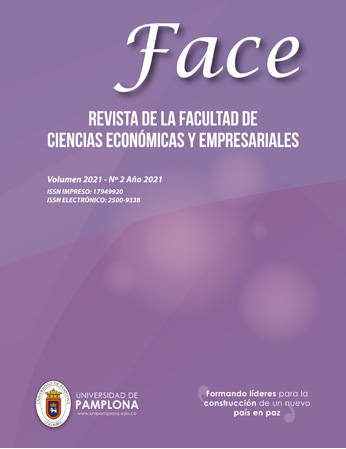Análisis de estrategia en redes sociales para el sector de los restaurantes colombianos en tiempos de crisis por la pandemia covid-19
DOI:
https://doi.org/10.24054/face.v21i2.1106Palabras clave:
Marketing relacional digital, Redes sociales, RestaurantesResumen
El mercadeo en redes sociales es una de las tendencias más importantes en la actualidad, ya que las empresas, incluidos los restaurantes han tenido que migrar a los entornos digitales para sobrevivir a la crisis causada por la pandemia Covid-19. El objetivo de este documento es analizar la estrategia de los restaurantes colombianos en las dos redes sociales con mayor Retorno sobre la inversión en Latinoamérica: Facebook e Instagram (Hubspot, 2021), y realizar un análisis de correlación entre las variables seleccionadas permitiendo así definir, mejorar e informar acerca de las mejores prácticas en el sector. Para alcanzar este objetivo se recolectó por medio de netnografía la información de una muestra de 146 restaurantes colombianos, y se analizaron de forma general, para posteriormente hacer una división entre franquiciado o no, esto último con la intención de conocer si hay fortalezas en la estrategia en redes sociales que las diferencian de los restaurantes que no lo son, y así determinar si cuentan con mejores prácticas que puedan ser adoptadas por el sector.
Descargas
Referencias
Barzola, L., Jara, J., & Aviles, P. (2019). Importancia del Marketing Digital en el Comercio Electrónico. E-IDEA Journal of Business Sciences, 1(3), 24-33.
Castaño, J. J., & Jurado, S. (2016). Marketing digital (Comercio electrónico). Editex.
Cartagena, D. J. (2017). Millennials y redes sociales: estrategias para una. Miguel Hernández Communication Journal, 355.
Comscore (2020). Análisis Global: El Efecto de la Pandemia del Coronavirus en Social Media. Recuperado de: https://www.comscore.com/lat/Prensa-y-Eventos/Blog/Analisis-Global-El-Efecto-de-la-Pandemia-del-Coronavirus-en-Social-Media
Conti, E., & Lexhagen, M. (2020). Instagramming nature-based tourism experiences: a netnographic study of online photography and value creation. Tourism Management Perspectives, 34, 100650.
David, F. R. (2003). Conceptos de administración estratégica. Pearson Educación.
Elliott, R., Shankar, A., Langer, R., & Beckman, S. C. (2005). Sensitive research topics: netnography revisited. Qualitative market research: An international journal.
Espinoza López, J. A., & Ramírez Flores, D. M. (2019). Diseño de estrategias de marketing digital para el restaurante Leos de Mariscos del Cantón Naranjal (Bachelor's thesis, Universidad de Guayaquil Facultad de Ciencias Administrativas).
Galván-Guardiola, Y. Y. (2018). Redes sociales y tendencias de marketing digital en los negocios. Latindex, 702.
Hubspot (2021). Informe estado actual de marketing digital. recuperado de: https://www.hubspot.es/estado-del-marketing
Kotler, F., & Armstrong, G. (2015). Fundamentals of marketing. Moscow: Progress.
Kozinets, R. V. (2007). Netnography. The Blackwell Encyclopedia of Sociology, 1-2.
Linares Cazola, J. G., & Pozzo Rezcala, S. K. (2018). Las redes sociales como herramienta del marketing relacional y la fidelización de clientes.
Matosas-López, L. (2021). The Management of Digital Marketing Strategies in Social Network Services: A Comparison between American and European Organizations. Journal of Open Innovation: Technology, Market, and Complexity, 7(1), 65.
Muñoz (2010). La Franquicia, una estrategia de crecimiento empresarial. recuperado de: https://www.eafit.edu.co/revistas/revistamba/Documents/franquicia-estrategia-crecimiento-empresarial.pdf
Kumar, V. (2015). Evolution of Marketing as a Discipline: What Has Happened and What to Look Out For. Journal of Marketing, 79(1), 1-9. Retrieved July 23, 2020, from www.jstor.org/stable/43784378
Michael, F. F. M. B. U., Work, E. P. S., & Porter, M. Michael E. Porters Five Forces Model E-book From Wikipedia. Innovation, 15(4.2), 3.
Montenegro Delgado, L. A. (2018). Estrategias de marketing relacional para el posicionamiento de la marca del restaurante–Cevicheria el Burrito-Lambayeque, 2016.
Morais, G. M., Santos, V. F., & Gonçalves, C. A. (2020). Netnography: Origins, Foundations, Evolution and Axiological and Methodological Developments and Trends. The Qualitative Report, 25(2), 441-455.
Patro, C. S. (2021). Digital Tourism: Influence of E-Marketing Technology. In Impact of New Media in Tourism (pp. 234-254). IGI Global.
Portafolio (2021). En 2020 el 45% de servicios de comida fueron domicilios. Recuperado de: https://www.portafolio.co/economia/aplicaciones-rappi-o-ifood-en-2020-el-45-por-ciento-de-servicios-de-comida-fueron-domicilios-548413
Quispe, V., & Linda, R. (2019). Marketing relacional enfocado a la fidelización de los clientes del restaurante mar criollo, Lima 2019.
Semana (2021). Cuántos bares y restaurantes han cerrado por el coronavirus. Recuperado de: https://www.semana.com/empresas/articulo/cuantos-bares-y-restaurantes-han-cerrado-por-el-coronavirus/299647/
Descargas
Publicado
Número
Sección
Licencia
Derechos de autor 2021 Yenny Katherine Parra Acosta,Carlos Alberto Almanza,Diego Felipe Astudillo Valverde

Esta obra está bajo una licencia internacional Creative Commons Atribución-NoComercial-CompartirIgual 4.0.





